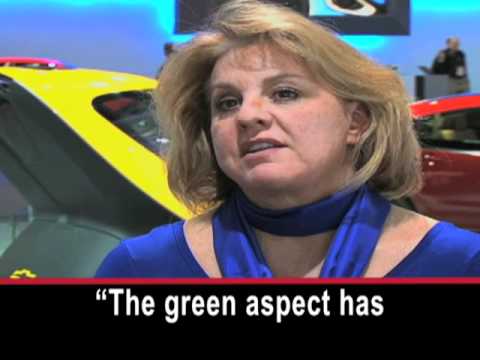Drive for 'Green' Cars Leave Some Auto Workers Behind
 |
Correction: General Motors says its strategy is "focused on alternatives and greater fuel efficiency." GM official Mary Beth Stanek did not say GM was "moving away from trucks and sport utility vehicles" as part of that strategy. This story incorrectly said she did.
From voaspecialenglish.com | facebook.com/voalearningenglish
Nicole Current has worked 15 years in the automobile industry, but she is losing her job.
NICOLE CURRENT: "I make truck axles, so as the auto industry tries to get away from the larger size vehicles, and tries to get to more fuel efficient, more economical vehicles, and gas prices being where they are with what product we make, it makes it extremely difficult when, the actual economy, people aren't buying trucks."
People are buying cars like the Toyota Prius. Its power comes from electricity and gasoline. Toyota's Greg Thome says sales are increasing.
GREG THOME: "The Prius has done really well. We expect our sales this year to grow incrementally as far as Prius is concerned, because we are growing, basically, from one Prius model to a family of four vehicles."
Toyota presented its Prius C at the North American International Auto Show in Detroit. Greg Thome says the Prius C is a low-cost vehicle that is not costly to operate.
GREG THOME: "The recession certainly hit all models. Now we're starting to see a lot of people come back to the market, including for new technologies like hybrids and so forth."
Almost every carmaker at the Detroit Auto Show was selling fuel-efficient models. Mary Beth Stanek of General Motors says her company is moving away from trucks and sport utility vehicles.
MARY BETH STANEK: "The green aspect has been coming along for some time. Naturally, we want to make sure we have alternatives to petroleum as well. Our business doesn't want to be dependent on one particular type of energy source. So it behooves us as a company to make sure we have a lot of offerings and that we kind of ride out the instability of petroleum pricing."
Demand for smaller and more fuel-efficient cars continues to influence the American automobile industry. Factories are being re-opened, and jobs are returning to an industry that dismissed thousands of workers in the past ten years. That is good news for many, but not such good news for workers like Nicole Current.
NICOLE CURRENT: "Although I am losing my job, as a union member, I'm just still one piece of that pie. And I definitely believe that we are going in the right direction with the leadership that we have in place."
Ms. Current hopes she can someday find a job making the smaller cars American drivers are now buying. I'm Mario Ritter.
|




